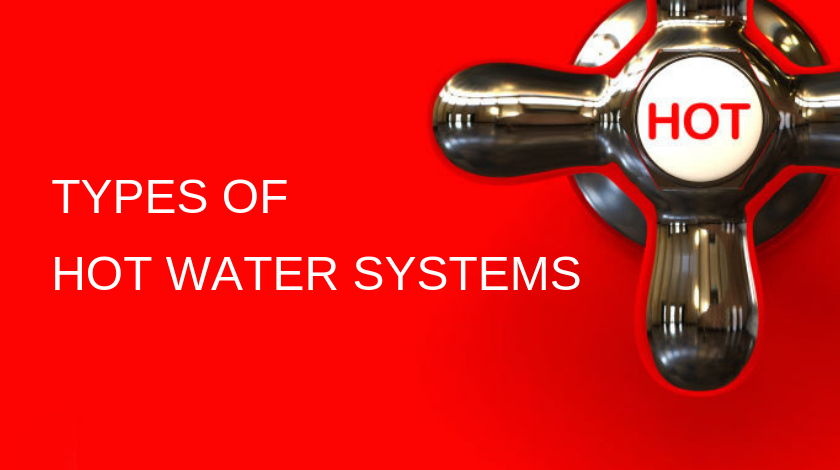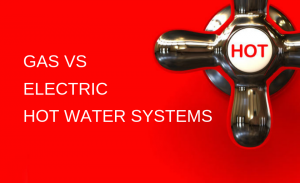Considering that about 20% of the total energy expended in an average Australian home goes into water heating, it is clear that hot water systems are quite important. Hot water heaters come in different types; hence, choosing the right option depends on a couple of factors, including the demand, energy usage, and efficiency.
Let’s start by taking a look at the most popular types of hot water systems available in the market.
Types of Hot Water Systems
Electric Hot Water Systems
Just like you have in an electric kettle, there is a heating element located inside a tank in an electric hot water system. The tanks, which are available in different sizes, keep the heated water until it is ready for use. There are also instantaneous electric hot water heaters, and they heat water instantly when needed, rather than heating and preserving. This option offers an endless hot water supply. The initial cost of running an electric heater is always cheaper. However, things can become more expensive in the long run. Consider all these before settling for any of these water heater options.
Gas Hot Water Systems
Similar to what you have in the electric hot water systems, the hot water is heated and stored until it is needed. However, rather than using electricity to heat the water, gas hot water systems use gas storage heaters. Hence, they have quicker heat recovery times and mostly smaller tanks. There are gas instant water heaters as well, which rely on gas burners to heat the water immediately on demand, rather than storing the hot water in the tank. With this, you cannot run out of hot water.
Solar Hot Water Systems
The energy source in solar hot water systems is renewable. Thus, they have mild effects on the environment. Solar-powered hot water systems rely on multiple solar panels, usually set up on a roof to ensure maximum exposure to the sun. The energy absorbed is circulated through and use to heat the water. Users of solar hot water systems combine them with gas or electricity to ensure that there is hot water in times when the sun is unavailable.
A solar hot water supply requires access to solar and sufficient north-facing roof space to function properly.
Heat Pump Hot Water Systems
This offers more efficiency compared to the solar hot water system. Also renewable, the energy source here is the heat extracted from the surroundings by the heat pump. The energy, usually absorbed from the air, water, or ground, is converted to heat by a ‘reverse refrigeration’ process, and then used to heat water. Talking about efficiency, this type of hot water system uses up to two-thirds less electricity compared to a total electric hot water heater. Although you may spend more on these systems than the traditional options, they offer higher energy efficiency and help you save more in the long run.
Which should you go for?
A couple of factors will determine your eventual choice of a hot water system, including your requirements, type and size of the home, and your budget. Choosing the right hot water system for your home is a major decision – one you don’t make every time. Hence, you should put in the research and make findings before deciding on the best option. An ideal hot water system should provide adequate hot water, reduce the greenhouse gas emissions from your household, and help you save money.
Below are the crucial factors you should consider when choosing an ideal hot water system for your home:
Household size
This entails the number of persons living in your home and your hot water consumption pattern. Do you all bathe at once? Do you use the dishwasher and washing machine at once? Your answers to these will help you to determine the best hot water system type for you, i.e. one with the right size and energy source. Never forget to factor in the use of showerheads – the good ones help to reduce the volume of hot water and are vital to sizing a Hot Water Supply.
Cost/Budget
This entails both the running and purchase costs. The amount of energy your hot water system consumes will affect how much you expend on energy bill in the long run. Hence, you must take the time to choose the right system. Depending on the type of system, the operating cost and energy cost vary. In the case of solar hot water systems, the running cost and tariff will depend on the location. Note that a hot water system with lower running costs will increase the resale value of any home. Check out Rheem’s hot water system cost calculator to know the estimated operating costs between different types of hot water systems.
Available Space
How much space can you spare for a hot water system? Knowing this will help you know the right size of the hot water system to go for.
Accessible Energy Sources
Your current type of hot water system power source will be a factor in your decision. Especially when choosing between gas or electric hot water systems. Although you can easily convert an existing hot water supply into more sustainable ones. You can combine some standard electric hot water storage systems with a split system like a heat pump or solar hot water supply units.
Sometimes, homeowners are restricted by the energy sources available to them. Natural gas is readily available in some areas, while in other places, solar panels and heat pumps are the only available energy sources. Talking about a solar-powered hot water system, the total roof space and shade area are important factors to consider. You will spend more on an LPG hot water system if your hot water consumption is high. After all, the tariffs are similar to a day-rate electricity tariff.
The energy source is crucial to the level of greenhouse gas emissions from your home. An electric storage water system produces more greenhouse gas compared to a natural gas hot water system. The heat pump or solar hot water systems are known to emit the lowest amount of greenhouse gas.
Taking all this into consideration will ensure the right decision is made when choosing between types of host water systems. Not sure which is best for your home? Get expert advice on all types of hot water systems from the best local hot water plumbers near you!







